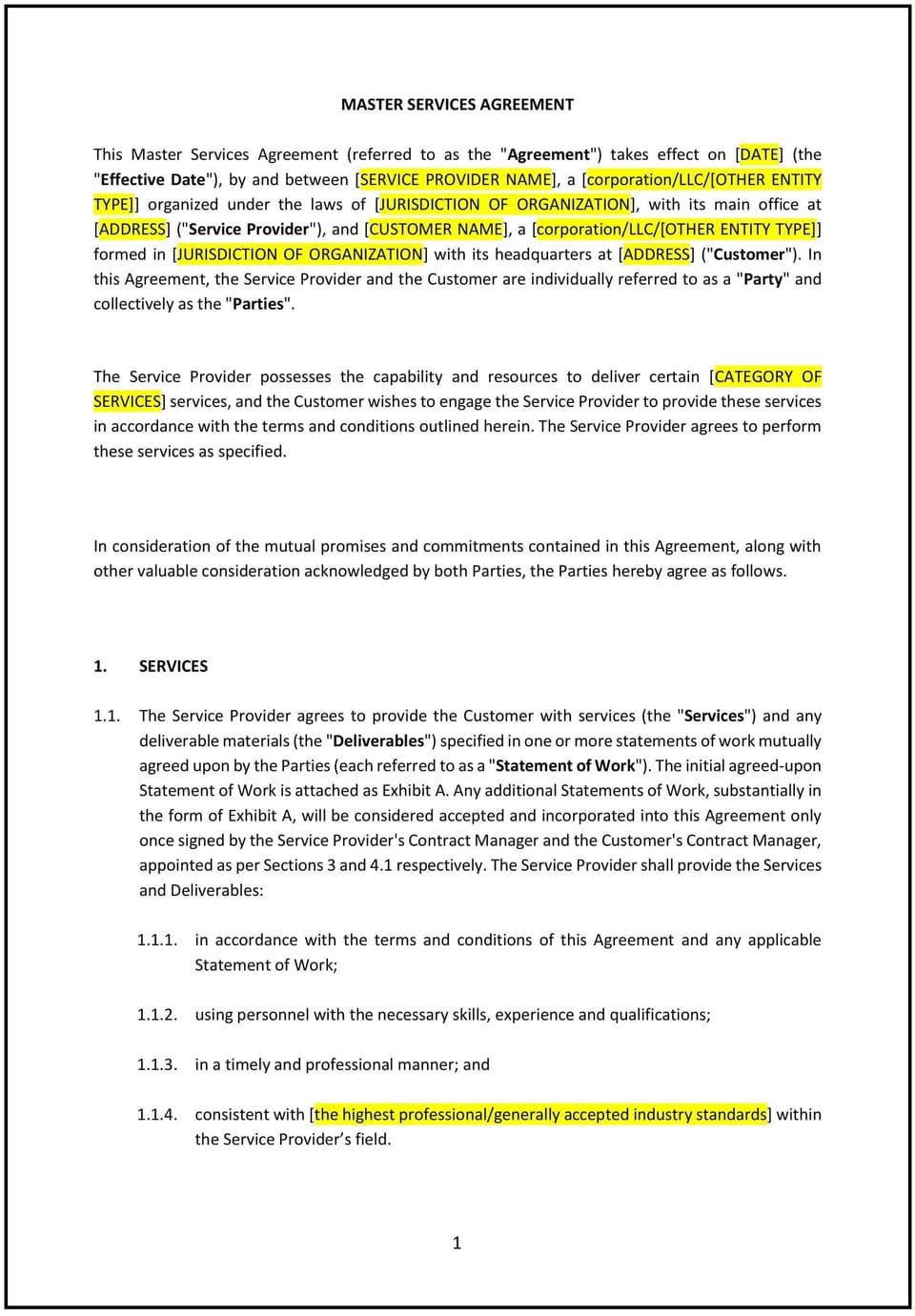Master Services Agreement (West Virginia): Free template

Master Services Agreement (West Virginia)
A Master Services Agreement (MSA) in West Virginia is a legally binding contract that establishes the overarching terms between a service provider and a client for multiple projects or long-term engagements. This agreement is widely used in industries such as technology, consulting, healthcare, and professional services, where businesses require ongoing service relationships.
West Virginia businesses use an MSA to streamline contract negotiations, reduce legal risks, and create consistency in service engagements. Instead of renegotiating terms for each project, businesses can rely on a standardized agreement while handling specific project details in separate Statements of Work (SOWs). West Virginia contract law allows flexibility in structuring MSAs, making them an effective tool for businesses to protect their interests through clearly defined payment terms, liability limitations, and dispute resolution mechanisms.
For companies operating in West Virginia, an MSA provides legal clarity, helps manage service-based relationships, ensures prompt payments, and minimizes legal disputes. West Virginia’s contract laws generally uphold well-drafted agreements, but businesses should ensure that their MSAs comply with state labor laws and industry regulations, particularly in highly regulated sectors such as healthcare and government contracting.
Tips for drafting and maintaining a Master Services Agreement in West Virginia
- Clearly define the scope of services to prevent misunderstandings and disputes. Businesses should specify deliverables, timelines, and expectations upfront.
- Establish payment terms, including invoicing procedures, late payment penalties, and any required deposits. West Virginia law enforces written payment terms to ensure contractual clarity.
- Include limitation of liability clauses to minimize financial exposure. West Virginia law upholds contractually agreed-upon liability limits as long as they are reasonable.
- Specify intellectual property (IP) ownership, ensuring clarity on who owns deliverables and any associated rights. Businesses should include work-for-hire clauses if they expect to retain ownership of all deliverables.
- Address dispute resolution, specifying whether conflicts will be handled through West Virginia courts, arbitration, or mediation. Many West Virginia businesses opt for arbitration to resolve disputes efficiently.
- Incorporate a force majeure clause to protect against liability if unforeseen events, such as natural disasters or supply chain disruptions, prevent service completion.
Frequently asked questions (FAQs)
Q: What should West Virginia businesses include in a Master Services Agreement?
A: An MSA should outline service scope, payment terms, liability limitations, intellectual property rights, termination terms, and dispute resolution mechanisms.
Q: How does a Master Services Agreement benefit businesses in West Virginia?
A: It creates a standardized contract framework, reducing negotiation time and ensuring service consistency across multiple projects.
Q: Can an MSA override West Virginia state laws?
A: No, while an MSA establishes contract terms, it must comply with West Virginia contract laws and industry regulations.
Q: Should a Master Services Agreement in West Virginia include a termination clause?
A: Yes, specifying termination rights allows both parties to exit the agreement under clear conditions, such as with advance notice or for cause.
Q: How can businesses ensure enforceability of an MSA in West Virginia?
A: The agreement should be clear, legally reviewed, and comply with West Virginia contract laws, particularly regarding independent contractor classification, indemnification, and liability limitations.
Q: Are verbal MSAs enforceable in West Virginia?
A: While some verbal contracts may be legally binding in West Virginia, a written agreement provides stronger legal protection and avoids misunderstandings.
Q: Does West Virginia law require businesses to include indemnification clauses in MSAs?
A: While not required, West Virginia businesses often include indemnification clauses to protect against legal claims and liabilities related to service performance.
This article contains general legal information and does not contain legal advice. Cobrief is not a law firm or a substitute for an attorney or law firm. The law is complex and changes often. For legal advice, please ask a lawyer.


